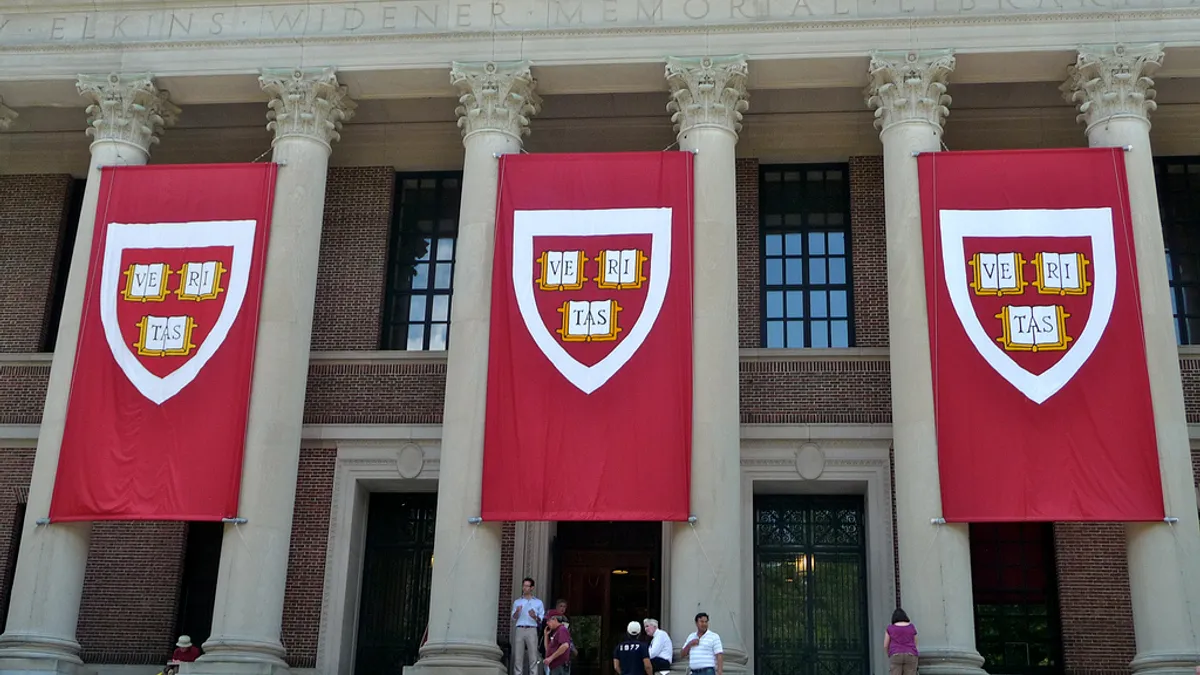Dive Brief:
-
The Trump administration has rescinded a policy barring international students from remaining in the U.S. if they enrolled solely in online courses this fall.
-
The directive was the subject of intense backlash and a slew of lawsuits led by Harvard University and the Massachusetts Institute of Technology.
-
Policy experts predict the White House will try again to limit foreign student enrollment, but not to the same extent.
Dive Insight:
U.S. Immigration and Customs Enforcement (ICE) unveiled the directive earlier this month — a move widely seen as a way to pressure administrators to reopen their campuses. Because officials have dropped the order, foreign students, at least for now, will be permitted to take their courses fully online.
A federal judge announced the administration had backed away from the policy during a court hearing Tuesday, according to news reports.
The reversal followed harsh and immediate criticism from all corners of higher ed, as well as among Democratic lawmakers and state officials.
Campus leaders said the policy change threatened their fall plans, many of which they are still formulating as verified cases of the coronavirus climb in the U.S. Meanwhile, states touted the benefits of international students on their economies.
At least nine lawsuits, including one Monday from 18 Democratic attorneys general seeking to halt the order, targeted the administration for allegedly failing to release the policy through the proper legal channels, namely the Administrative Procedure Act.
Prior to Tuesday's hearing, lawyers representing the U.S. Department of Homeland Security argued in court filings that international students weren't permitted to complete their programs fully online before the pandemic. The administration temporarily waived those federal restrictions earlier this year, stating it was allowing foreign students to take their course loads virtually "for the duration of the emergency."
ICE's attorneys also said in the recent filings that virtual learning would enable international students to be anywhere in the country, which they alleged "raises significant national security concerns."
But the facts weren't there to support their arguments, said Bill Hing, a law and immigration professor and director of the Immigration and Deportation Defense Clinic at the University of San Francisco. Hing pointed out that foreign students had been learning virtually since the end of March, and no national security emergency arose.
The order was "arbitrary" because "it made no sense," Hing said. Although the government was declaring that foreign students didn't need to be in the country if they were learning online, the point of visa programs goes far beyond students simply attending school, he said, noting that the experience gives students a view of American society.
Chris Marsicano, a professor of educational studies at Davidson College believes federal officials knew they were going to lose the cases.
Marsicano, who studies higher ed lobbying, crafted a social media campaign using the #StudentBan hashtag to get officials to overturn the policy. He credits the endeavor with amplifying international students' voices.
Coordinated efforts by a wide contingent of postsecondary institutions, combined with pressure from his and other grassroots work, likely contributed to the administration changing course, he said.
"It's a hard story to swallow," Marsicano said. "The big, bad federal government coming after raw talent — brilliant students who come to make a better life in the United States. It's hard to engage in a legitimate policy debate about this."
However, Marsicano believes officials will devise a new rule concerning international students. That's the Trump administration's playbook, he said — attempt a "brash" policy change, walk it back and try something more moderate later. For instance, early in his tenure, President Donald Trump issued an executive order barring foreign nationals from predominately Muslim countries, which courts initially shot down. His third attempt at a ban was eventually upheld by the U.S. Supreme Court.
Earlier Tuesday, The Wall Street Journal reported the administration was weighing an alternative policy that would potentially apply only to newly enrolling foreign students.
However, Hing doubted that officials would have time to develop a new legal rule, considering the looming academic year.
More than 200 colleges had backed the Harvard and MIT lawsuit. A brief filed Monday by a group of 59 institutions, including the rest of the Ivy League, argued that making the announcement just weeks before the start of the academic year threw their carefully crafted reopening plans into disarray.
The colleges, which according to the brief collectively enroll about 213,000 international students each year, said the order had already affected those students. Another 180 colleges filed a similar brief endorsing the lawsuit last week.
"International students are an extraordinary benefit not just to American higher education but to our entire nation, resulting in a wealth of new ideas, cultural connections, cutting-edge technology, and life-saving medical advances, including in the fight against COVID-19," Ted Mitchell, president of the sector's top lobbyist, the American Council on Education, said in a statement.














